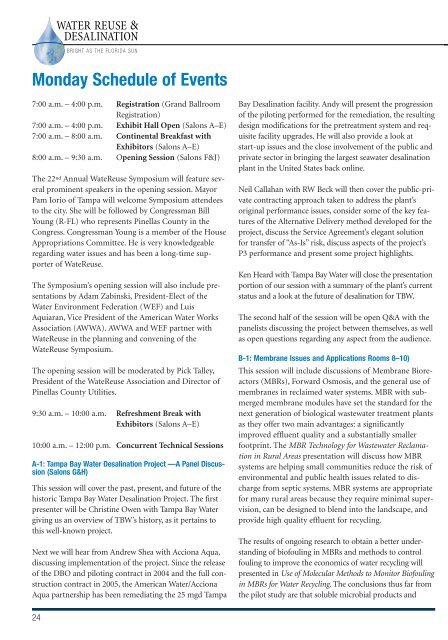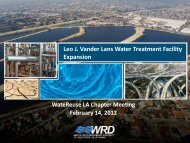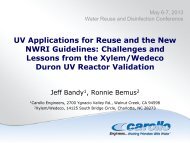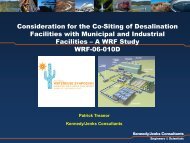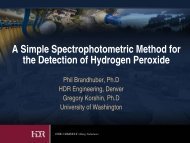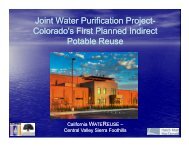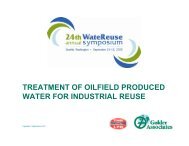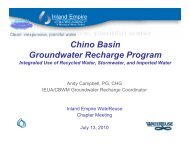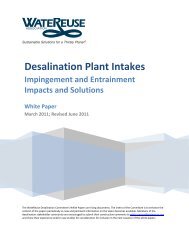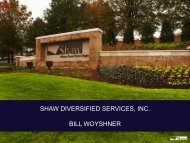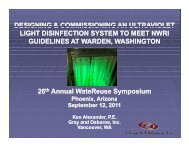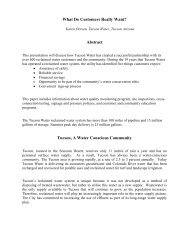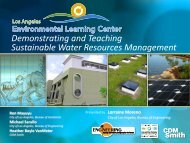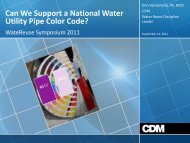Conference Program - WateReuse Association
Conference Program - WateReuse Association
Conference Program - WateReuse Association
Create successful ePaper yourself
Turn your PDF publications into a flip-book with our unique Google optimized e-Paper software.
WATER REUSE &DESALINATIONBRIGHT AS THE FLORIDA SUNMonday Schedule of Events7:00 a.m. – 4:00 p.m. Registration (Grand BallroomRegistration)7:00 a.m. – 4:00 p.m. Exhibit Hall Open (Salons A–E)7:00 a.m. – 8:00 a.m. Continental Breakfast withExhibitors (Salons A–E)8:00 a.m. – 9:30 a.m. Opening Session (Salons F&J)The 22 nd Annual <strong>WateReuse</strong> Symposium will feature severalprominent speakers in the opening session. MayorPam Iorio of Tampa will welcome Symposium attendeesto the city. She will be followed by Congressman BillYoung (R-FL) who represents Pinellas County in theCongress. Congressman Young is a member of the HouseAppropriations Committee. He is very knowledgeableregarding water issues and has been a long-time supporterof <strong>WateReuse</strong>.The Symposium’s opening session will also include presentationsby Adam Zabinski, President-Elect of theWater Environment Federation (WEF) and LuisAquiaran, Vice President of the American Water Works<strong>Association</strong> (AWWA). AWWA and WEF partner with<strong>WateReuse</strong> in the planning and convening of the<strong>WateReuse</strong> Symposium.The opening session will be moderated by Pick Talley,President of the <strong>WateReuse</strong> <strong>Association</strong> and Director ofPinellas County Utilities.9:30 a.m. – 10:00 a.m. Refreshment Break withExhibitors (Salons A–E)10:00 a.m. – 12:00 p.m. Concurrent Technical SessionsA-1: Tampa Bay Water Desalination Project —A Panel Discussion(Salons G&H)This session will cover the past, present, and future of thehistoric Tampa Bay Water Desalination Project. The firstpresenter will be Christine Owen with Tampa Bay Watergiving us an overview of TBW’s history, as it pertains tothis well-known project.Next we will hear from Andrew Shea with Acciona Aqua,discussing implementation of the project. Since the releaseof the DBO and piloting contract in 2004 and the full constructioncontract in 2005, the American Water/AccionaAqua partnership has been remediating the 25 mgd TampaBay Desalination facility. Andy will present the progressionof the piloting performed for the remediation, the resultingdesign modifications for the pretreatment system and requisitefacility upgrades. He will also provide a look atstart-up issues and the close involvement of the public andprivate sector in bringing the largest seawater desalinationplant in the United States back online.Neil Callahan with RW Beck will then cover the public-privatecontracting approach taken to address the plant’soriginal performance issues, consider some of the key featuresof the Alternative Delivery method developed for theproject, discuss the Service Agreement’s elegant solutionfor transfer of “As-Is” risk, discuss aspects of the project’sP3 performance and present some project highlights.Ken Heard with Tampa Bay Water will close the presentationportion of our session with a summary of the plant’s currentstatus and a look at the future of desalination for TBW.The second half of the session will be open Q&A with thepanelists discussing the project between themselves, as wellas open questions regarding any aspect from the audience.B-1: Membrane Issues and Applications Rooms 8–10)This session will include discussions of Membrane Bioreactors(MBRs), Forward Osmosis, and the general use ofmembranes in reclaimed water systems. MBR with submergedmembrane modules have set the standard for thenext generation of biological wastewater treatment plantsas they offer two main advantages: a significantlyimproved effluent quality and a substantially smallerfootprint. The MBR Technology for Wastewater Reclamationin Rural Areas presentation will discuss how MBRsystems are helping small communities reduce the risk ofenvironmental and public health issues related to dischargefrom septic systems. MBR systems are appropriatefor many rural areas because they require minimal supervision,can be designed to blend into the landscape, andprovide high quality effluent for recycling.The results of ongoing research to obtain a better understandingof biofouling in MBRs and methods to controlfouling to improve the economics of water recycling willpresented in Use of Molecular Methods to Monitor Biofoulingin MBRs for Water Recycling. The conclusions thus far fromthe pilot study are that soluble microbial products and24


